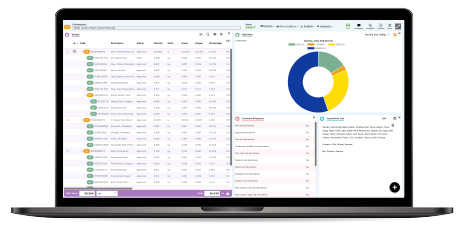To maintain a competitive edge in today’s rapidly evolving food industry, companies must be able to quickly adapt to meet regulatory and consumer demands. Traditional methods of managing New Product Development (NPD) have become a barrier to innovation, leading to delays and errors.
This article explores six key benefits of embracing purpose-built tools like FoodChain ID’s Recipes & Specifications solution in food and beverage innovation to manage these complex requirements.
1. Enhanced Data Management
Data is the backbone of food product development, yet managing it can be a significant challenge. Traditional methods often involve manual entry, spreadsheets and scattered documentation, leading to errors, data silos and inefficiencies. Digital solutions offer a centralized platform where all data related to ingredients, nutritional content, allergens and more can be stored, accessed and analyzed in real-time.
With enhanced data management, you can ensure that every piece of information is accurate, up-to-date and easily retrievable. This not only reduces the risk of errors but also allows for more informed decision-making, ultimately leading to better product outcomes.

2. Streamlined Workflows
The complexity of food product development requires collaboration across various departments, including Research & Development (R&D), quality assurance, regulatory compliance and marketing. Managing these workflows manually can be time-consuming and prone to bottlenecks. Digital solutions streamline these processes by automating routine tasks, enabling seamless communication and providing visibility into every stage of development.
By streamlining workflows, your team can focus more on innovation and less on administrative tasks. This leads to faster project completion, reduced time-to-market and a more efficient use of resources.
3. Improved Decision Making
Making the right decisions at each stage of product development is crucial for success. However, traditional methods can leave decision-makers with incomplete or outdated information. Digital solutions provide real-time data and analytics, empowering you to make informed decisions based on accurate, comprehensive insights.
Whether you’re determining the nutritional profile of a new product, assessing the impact of a formulation change or creating a compliant food label, having access to the right data at the right time ensures that your decisions are aligned with business goals.

4. Accelerated Market Readiness
In the competitive food industry, speed to market can be a critical differentiator. Digital solutions accelerate market readiness by reducing the time spent on manual data entry, approval processes and compliance checks. With automated workflows and real-time data, you can quickly identify and address any issues that might delay product launch.
Faster market readiness means you can seize opportunities, respond to consumer demands and outpace competitors, all while maintaining the high standards of quality and compliance that your brand is known for.
5. Enhanced Collaboration and Knowledge Sharing
Product development in the food industry is rarely a solo endeavor. It involves input from various stakeholders, including suppliers, manufacturers, regulatory bodies and even consumers. Digital solutions foster enhanced collaboration by providing a shared platform where all stakeholders have common visibility, can collaborate on key activities, and leverage historical knowledge and best practices.
This collaborative environment not only improves communication but also ensures that everyone is working from the same set of data and standards. The result is a more cohesive development process, fewer misunderstandings and improved stakeholder relations.

6. Assured Compliance & Quality
Compliance with regulatory standards and maintaining product quality are non-negotiable in the food industry. However, keeping up with ever-changing regulations and multiple markets can be daunting without the right tools. Digital solutions help you stay ahead by automating compliance checks and maintaining detailed records of the product throughout its lifecycle.
With assured compliance and quality, you can confidently bring products to market knowing that they meet all the necessary standards.
The food industry is at a pivotal moment, where the adoption of digital solutions is no longer just an option but a necessity for staying competitive. By leveraging tools like FoodChain ID’s Recipes & Specifications solution, you can transform your product development processes, making them more efficient, collaborative and aligned with market demands.
FoodChain ID’s Recipes & Specifications solution is an end-to-end tool built from the ground up to support food and beverage innovation and change management. This cloud-based platform supports supplier collaboration, digital specification management, advanced recipe development, compliant label generation, automated product data sheets and more.











